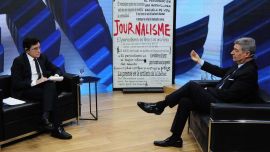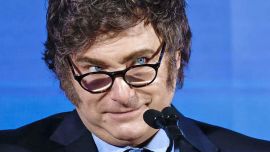The Central Bank has tightened limits on the amount of dollars savers can purchase after Alberto Fernández's victory in Sunday's presidential election, limiting purchases to US$200 a month via bank account and US$100 in cash.
On Sunday, Fernández swept to victory in the first round of the presidential vote election with 48 percent of the vote, above the 45-point threshold needed to win outright.
Quickly afterwards, the monetary institution said it would allow Argentines to buy just US$200 per month, compared with the US$10,000 per month set on September 1, according to a statement from the Central Bank.
The move looks to preserve international reserves during the political transition which will culminate in the handover on December 10 but risks causing the black market exchange rate to skyrocket. Last week Argentines rushed to buy dollars and withdraw deposits ahead of the vote on concern that more controls were coming amid an economic crisis.
Given the current degree of uncertainty, the Board of Directors of BCRA [Central Bank of the Republic of Argentina] decided to take a series of measures this Sunday that seek to preserve the reserves of the Central Bank. The measures announced are temporary, until December 2019," read the statement.
"A new limit of US$200 per month is established for the purchase of dollars for individuals with a bank account and US $100 for the amount of dollars that can be purchased in cash," continued the release, adding "these limits are not cumulative."
Officials said Central bank chief Guido Sandleris would give a press conference at 8.30am on Monday morning to address the new rule.
Immediately after the Central Bank's statement, many economists on Twitter predicted that the "blue" or unofficial exchange rate for the dollar would soar.
"200 greens [greenbacks, as in US dollars] a month. The blue is going to explode," wrote economist Mariano Kestelboim.
Mauricio Macri's government initially imposed foreign-exchange currency controls on Argentine exporters and citizens on September 1, in the wake of the Augsust 11 PASO primaries, in which Fernández easily defeated the president.
Exporters were ordered to seek permission from the Central Bank of Argentina before purchasing foreign currency and precious metals, in a bid to halt the flight of dollars out of the country, while individuals were restricted too, with a limit on US$10,000 a month in purchases.
The Central Bank has lost almost US$23 billion in reserves to now stand at US$43.5 billion.
Earlier in the night, the Central Bank had ruled out rumours it would declare a bank holiday on Monday. Officials at the monetary institution did, however, hold a meeting once the election's results were known to discuss their steps in response. The tightening of currency controls is the outcome of that meeting.
Argentina’s bonds are trading in deep distressed territory, about 40 cents on the dollar, and the government has said it wants to extend maturities both with private creditors and the International Monetary Fund.
That chore will likely fall to the incoming government though Fernández has yet to lay out an economic plan or name his cabinet.
Unconfirmed rumours on Sunday circulated that economist Guillermo Nielsen is favoured by Fernández to head the Central Bank. The Frente de Todos leader has already said Sandleris will not stay in the post.
– TIMES

























Comments